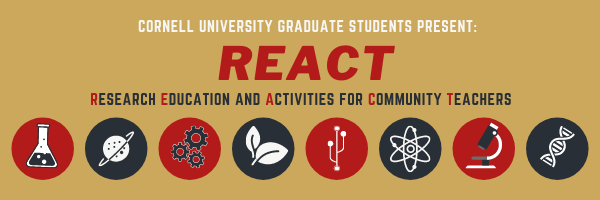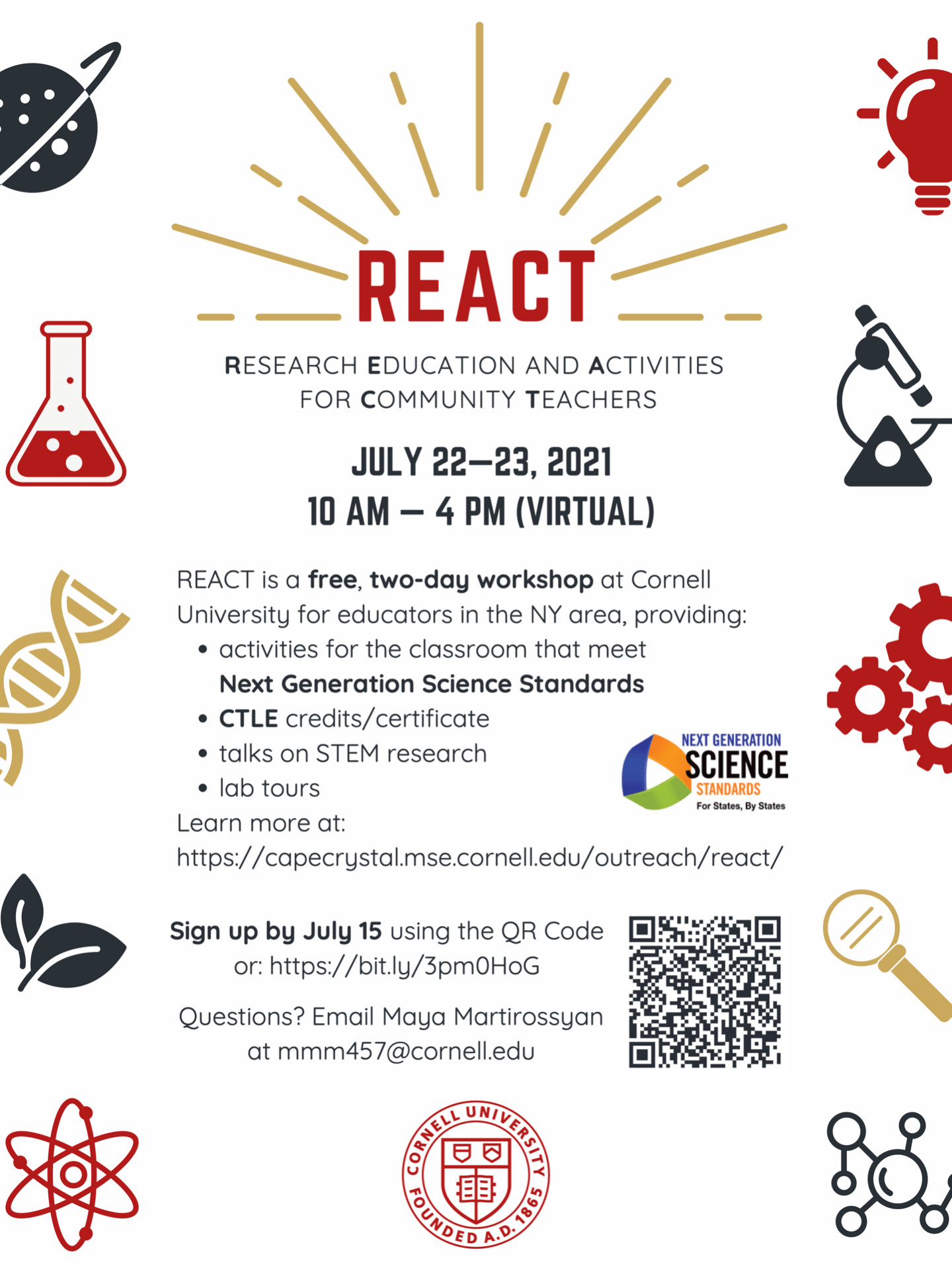The REACT (Research and Education Activities for Community Teachers) program connects K-12 educators to current research at Cornell University. Led by graduate students, this two-day workshop includes presentations on research and the path to higher education, lab tours, and demonstrations. The goal of REACT is to show teachers how cutting-edge research is performed today, equip them with activities that can help them bring that research back to the community and their students, and foster relationships between educators and graduate students. REACT was started at University of Michigan in 2017, and has grown tremendously since.
Due to continuing concerns and restrictions caused by the COVID-19 pandemic, the 2021 event was held virtually via Zoom on Thursday and Friday, July 22nd and 23rd, from 10 AM – 4 PM (EDT).
→ REACT 2021 recordings and materials
Agenda
Thursday, July 22, 2021
10:00 AM – 10:10 AM: Welcome & Introduction
Maya Martirossyan
10:10 AM – 11:25 AM: Materials & Computational Science
Organizer: Rachael Skye
- Electrons: What Are They Up To? – talk by Nathan Sitaraman
- Bright Beams Lab – tour by Cameron Duncan
- What is Energy? – talk by Bilal Azhar
- Tracking Energy in a Simple Rubber Band System – activity by Tucker Swenson
- Please find the materials for this activity here.
11:35 AM – 12:30 AM: Robotics, Technology, & the Classroom
Organizer: Zoe Pollard
- A Robotic Request from Pizza Pete – activity by Deanna Kocher
- Please find the materials for this activity here.
- Advancing Equitable and Inclusive Environments Across STEM – talk by Dana Chapman (+ followed by an optional discussion)
- Please find a downloadable list of resources here.
1:45 PM – 4:00 PM: Physics & Electricity
Organizer: Mel White
- Suntivich Group lab – tour by Abigail Nason
- You can view the recording of the lab tour here.
- Making Chemistry Happen by Directly Controlling Electrons – talk by Kyle Logan
- Eddy Current Brakes – activity by Yulan Chen
- Please find the materials for this activity here.
- You can find the resource on Linear Magnetic Brakes here.
- Molnar group lab – tour by Sunwoo Lee
- Investigating the ability for materials to conduct heat – talk by Gustavo Alvarez
- Scatter-Brained: light inside your body – activity by Mel White
- Light in your body applet
- Finding scattering points applet
- Please find the materials for this activity here.
- You can find the resource on Light Waves and Color: “Blue Skies and Red Sunsets” here.
Friday, July 23, 2021
10:00 AM – 11:15 AM: Chemistry
Organizer: Jasmin Kennard
- Playing in the Lab: Finding unexpected solutions to scientific problems – talk by Andrew Ressler
- Yang group lab – tour by Trevor Donadt
- ‘Super’ Color-Changing Materials – talk by Patrice Crosby
- Data Visualization for Scientists – activity by Aileen Luo
- To follow along with this activity, please follow this link.
11:45 AM – 12:30 PM: Teachers & Graduate students networking session
2:30 PM – 3:45 PM: Biology and Earth Sciences
Organizer: Aileen Luo
- Woods Hole Oceanographic Institute Mesocosm Laboratory – tour by Katherine Haviland
- Lawns as a Lab: Exploring Biodiversity in Unconventional Areas – talk by Hayden Bock
- Experimental petrology: a window to the interior of planets – talk by Daniella Reis
- Simulating Humans vs Zombies – activity by Maya Martirossyan
- To follow along with this activity, please follow this link. (Please don’t be alarmed if it takes a few minutes to work.)
3:45 PM – 4:00 PM: Closing
Maya Martirossyan
Organizing team
Maya Martirossyan (MSE)
Zoe Pollard (BEE)
Mel White (ECE)
Rachael Skye (MSE)
Aileen Luo (MSE)
Jasmin Kennard (CBE)
(MSE = Department of Materials Science and Engineering,
BEE = Department of Biological and Environmental Engineering,
CBE = Robert Frederick Smith School of Chemical and Biomolecular Engineering,
ECE = Department of Electrical and Computer Engineering)


